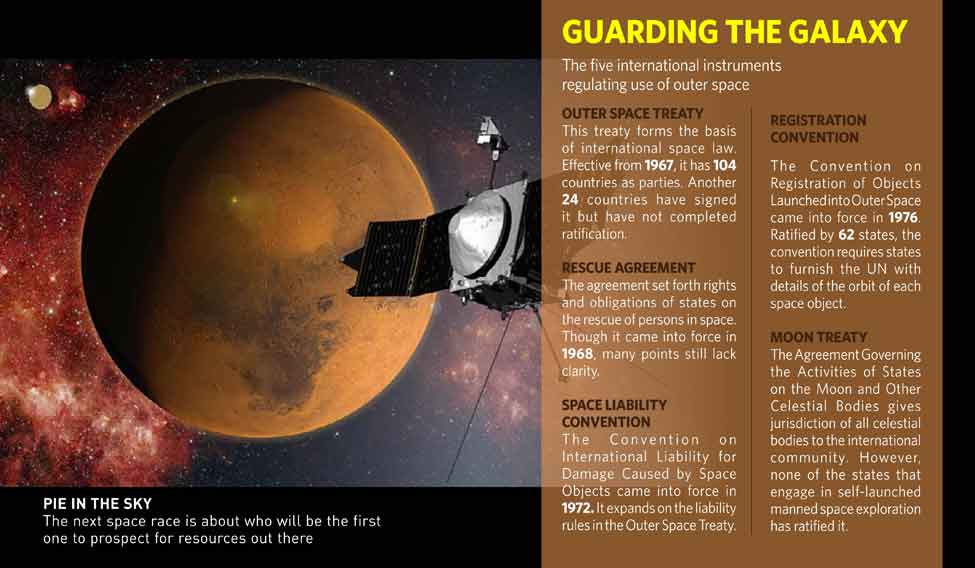In February, Luxembourg, a tiny European country of 5.4 lakh people, made the world sit up when it announced its lofty ambition to invest in space mining companies and establish a legal framework to ensure that those who mine asteroids and other celestial bodies in the near future get ownership of the ore they dig out.
Luxembourg is not a space-faring nation. Yet, it has seen the future and is moving quickly to stake its claim there. “Our aim is to open access to a wealth of previously unexplored mineral resources on lifeless rocks hurtling through space, without damaging natural habitats,” said Deputy Prime Minister Etienne Schneider. He said Luxembourg would support long-term economic development of innovative activities in space, hoping to become a hub for the space mining industry at a later date.
Has Luxembourg stolen a march over space-faring nations? Space explorations have reached a new stage, and the next space race is not going to be about which country lands first on which planet, but about who will be the first one to prospect for resources out there.
The 1967 Outer Space Treaty states that outer space, including the moon and celestial bodies, is not subject to national appropriation by claim of sovereignty. This basically means that outer space is the property of the entire mankind and it should be used only for peaceful purposes. However, recent advances and ambitions have made private companies question the treaty, which, they say, is ambiguous on whether it bans mining and other such explorations. Space is often compared to the seabed as well as international waters, which do not belong to any particular country. You may not own the sea, but if you fish it, the catch belongs to you. Space prospecting is yet to begin, but a section of experts feel that unless countries act fast, they may lose out. And, all agree that unless there are international laws, the future may be chaotic, with the pioneers exploiting resources and the latecomers struggling to find place for themselves.
The Luxembourg initiative follows close behind US President Barack Obama signing the Spurring Private Aerospace Competition and Entrepreneurship Act, 2015. This law allows US citizens to engage in commercial exploration and own the space resources they mine, including water and minerals but not biological life. At least two US companies are in the race to mine asteroids.
INDIA, WHICH HAS taken big strides in space explorations in the recent years, might just lose 'space race reloaded' if it doesn't act fast, and smart, say experts. As of now, India does not have a Space Act, and the existing telecom laws are inadequate for the telecom sector itself, let alone regulation of space activities, said lawyer Ranjana Kaul at a recent public discussion. So far, space exploration had been government-controlled, but with private players entering the fray, the laws need to be in place, she said. India needs to exert its clout to decide international rules of the game, too. “The world has decided that there will be no weaponisation of outer space, but there are issues of ownership of asteroids and their ores, which have to be decided on at both international and national levels,” said Kaul.
Said A. Sivathanu Pillai, distinguished professor, Indian Space Research Organisation, “Russia, the US and China all have plans of mining the moon by 2025-30. We need to be active in the international arena to ensure our interest is protected. Like Antarctica, different areas of the moon may be allotted to various countries for peaceful exploration, but we need to ensure that we get our share, too, and not be left out.”
India held its first meeting to discuss the need to formulate space laws in January. “We met in Bengaluru, and following that, the government is consulting various bodies,” said A.S. Kiran Kumar, chairman of ISRO. “There are many issues involved with space exploration, from allowing private players into the fray to international tie-ups, so almost every ministry, from defence to law to earth sciences, is involved.”
The space law, however, is still a distant dream. “Only after all the consultations will a draft be prepared and placed for public feedback,” said Kiran Kumar. No timeline has been set for this.
Amandeep Singh Gill, joint secretary at the ministry of external affairs, said the challenge was to protect space from militarisation. “There is always the threat of a cyber attack from outer space, or of a satellite getting destroyed,” he said. He maintained that India was an active member in legislating space laws at the international fora, and the inclusion of the foreign secretary in the Space Commission for the first time was significant.
He, however, noted that after the Moon Agreement of 1979, there wasn't much development in framing international laws. “The European Union had proposed a draft international code of conduct for space and India participated in the deliberations in New York last year, but there hadn't been much development since. We may be closer to developing Rule of the Road for soft laws, which was discussed at Vienna,” he said.
There are five international instruments regulating use of outer space: The Outer Space treaty (1967), Rescue Agreement (1968), Liability Convention (1972), Registration of Objects Launched into Outer Space Convention (1975) and the Moon Treaty (1979). However, these aren't enough to address and regulate emerging needs and challenges. So, with the absence of consensus at an international level and with individual countries making their own laws, will the next years see mayhem in outer space? “Unlikely,” said Kiran Kumar. “The US and all other legislations have to abide by existing agreements at least.”
While India has been slow to legislate, China hasn't come out with its Space Act so far, and Russia hasn't made any recent updates. But unless we step on the accelerator, India, with its space-faring legacy, may lose out to Luxembourg, with none.







